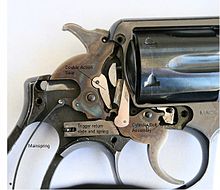Double action
Appearance
(Redirected from Double Action)

Double action (or double-action) refers to one of two systems in firearms where the trigger both cocks and releases the hammer.
- Double-action only (DAO) firearms trigger: The trigger both cocks and releases the hammer. There is no single-action function and the hammer will return to its decocked position after each shot.
- Double Action Kellerman (DAK): A variant of traditional double-action used on certain SIG Sauer semi-automatic pistols. DAK triggers have a long stroke with 29 N (6.5 lbf) pull. However, if a user shooting under stress short-strokes the trigger by only releasing it halfway, the trigger will reset, but with a 38 N (8.5 lbf) pull. This temporary increased trigger pull is intended to prevent negligent discharges.
- Double-action – firearms trigger: Pressing the trigger 1) cocks, and 2) drops the hammer. The hammer can also be cocked to fire in single-action (SA) mode.
- With a DA revolver, the hammer can be cocked first (single action), or the trigger can be pulled and it will cock and release the hammer (double action).[1] Once the gun has fired, the hammer stays in the decocked position until the hammer is re-cocked (single action), or the trigger is pulled again (double action).
- With a DA semi-automatic pistol, the initial trigger pull will cock and release the hammer (double action). The blowback from the firing mechanism automatically re-cocks the hammer after the gun is fired, such that each subsequent shot only requires the hammer to be released (single action). A decocker, if present on the pistol, can be used to return the hammer to its decocked position to prevent negligent discharges.
References
[edit]- ^ Barrett, Paul M. Glock: The Rise of America's Gun. United States, Crown, 2013. 10.
